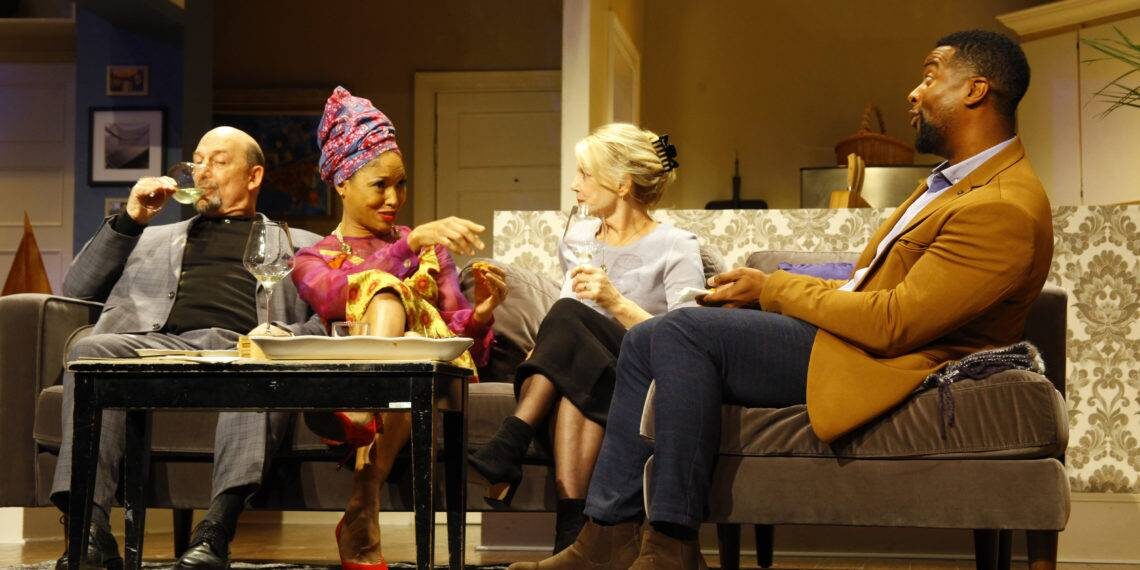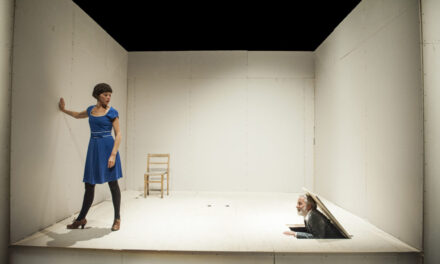James Sheldon’s Reparations is a new play about racial grievance, guilt, and retribution in America that, oddly enough, is both very smart and completely sincere. What I mean by that is that theatrical intelligence—particularly in the tonally tricky arena of race plays—usually seems to mean irony or cynicism nowadays: fractured realities, repurposed quotations, recycled myths, characters in masks or disguises. Reparations, by contrast, is resolutely personal, realistic and earnest. It’s almost like an essay in dramatic form, disconcertingly overt and explicit, like a blast of forthrightness from another time, though it’s set in today’s world.
The thoughtful directness of this work put me briefly in mind of another blast from the dramatic past sometimes faulted as too earnest and essayistic, the James Baldwin classic Blues for Mister Charlie (1964), which was loosely based on the Emmett Till murder case. Both Blues and Reparations are full of subtextless scenes where people say exactly and exhaustively what they think. Both plays seem to dare us to dismiss them as obvious or journalistic, then effectively seduce us with their searing discussions of brutally abused black characters refusing to play nice.
Reparations is being performed at the Billie Holiday Theater in Bedford-Stuyvesant, Brooklyn. At the performance I saw, the audience of about 100 was almost entirely black (I counted 4 white people including me), and the crowd spontaneously leapt to its feet at the curtain call, cheering with warm gratitude.
Sheldon’s action opens on the steamy entrance of a couple—a young black writer and an older white book editor—who evidently just met at a reception and can’t wait to get into bed. The next morning they’re still handsy and hot, but a certain captiousness in Reg (Kamal Bolden), also seen the night before, doesn’t quite chime with the hookup coziness. His snappish retorts to Ginny (Alexandra Heil) about numerous seemingly innocent passing remarks start to seem like race-baiting, and when she finally calls this out, a plot bombshell drops that sends events swerving in unforeseen directions.
Frustratingly, I can’t say much more about this, or the other surprises that stem from it, without spoiling the suspense. Suffice it to say that Reg, a novelist, actually did know Ginny and her late husband before, and some deeply ugly history is confronted when another couple, Ginny’s wealthy old friends Alistair and Millie (Gys de Villier and Lisa Arrindell), arrives for lunch. Ta-Nehisi Coates’s well-known 2014 argument for historical reparations to African-Americans tacitly hovers over the whole action, though the focus is on Reg’s particular case and the question of what is due him. The crowd reaction at the end of this play struck me as (at least in part) an exhale of relief that such urgent topical concerns hadn’t been overcomplicated with layers of reality-questioning theatricality but rather laid out plainly with lucid realism.
Michele Shay directs the fine company with an impressively steady hand, keeping the play’s emotional powder dry long enough to give the late-action fireworks their proper punch. All four actors skillfully traverse some pretty wide emotional ground, much of which is rougher and slippier than they make it look.
According to the program, Reparations is the first work by a white author to be produced at the Billie Holiday Theatre in its entire 47-year history. That’s no small matter. BHT is a proud, Obie-winning institution founded in the Civil Rights era that has consistently devoted itself to its local African-American community. This year, as part of a festival called “New Windows” conceived by Executive Director Indira Etwaroo, it is branching out and exploring “intersectionality and complexity of identity” as well as “voices and perspectives that have not historically been presented at The Billie.”
Reparations is a launchpad for that outreach to a larger audience. It’s a great reason to visit this theater, whether you’ve been there before or not.
This post was written by the author in their personal capacity.The opinions expressed in this article are the author’s own and do not reflect the view of The Theatre Times, their staff or collaborators.
This post was written by Jonathan Kalb.
The views expressed here belong to the author and do not necessarily reflect our views and opinions.


















